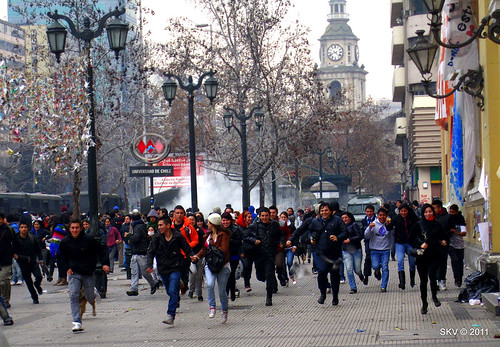
What started as a typically peaceful Metro ride to school in Santiago, Chile for international relations and Spanish major Frank Polizzi slowly turned sour as the smell of tear gas permeated the train.
When he exited the train, the streets were littered with signs and broken glass from protests turned violent. This was not part of Polizzi’s reality when he was packing his bags and embarking on a new journey in a new country.
A large protest took place in Santiago Thursday morning — one of many in the past weeks.
“They started at 10 a.m. and I was getting on the Metro at 10:30 to go to school and you could already smell the smell of tear gas in the air. When I got off the metro to go home there was just glass all over the street and broken rocks. I think today was pretty crazy,” said Polizzi, 21, who is studying abroad at the Pontifical Catholic University.
Polizzi was originally supposed to study abroad in Mexico, but the program was suspended this year by the California State University International Programs because of travel warnings to Mexico.
“We like to say that the program was suspended because we do expect to send students to Mexico again,” said Leo Van Cleve, director of the CSU IP.
According to Van Cleve, 33 students within the CSU system were accepted into the Mexico program. After the program was suspended, CSU IP handled the situation by allowing students to choose any country within the program to study in if they were still interested. Chile and Spain were the most popular choices by those who chose to continue with the application process, as many set to go to Mexico intended to study Spanish.
In Chile, students have been taking to the streets in protest since May, demanding equal access to education, to stop the escalating costs and for education to be free for all. Students who graduate from universities in Chile are subject to large personal debt because of the for-profit education system and the lack of support for quality education.
“Ironically, I came here and it was kind of crazy,” Polizzi said. “When we got here, the CSU didn’t warn us really of anything about the student protests. I read the news so I know it was going on, but I didn’t understand the extent to which it was going on… It seems like they didn’t really investigate Chile thoroughly enough.”
Polizzi spent most of his time during the first week touring Santiago with the other students. In the beginning, things in the city were mostly calm. Outside of the University, the whole building was covered in banners, graffiti and artwork for the protests. Students were selling merchandise related to the protest and a man would sit outside with a microphone and play music around the clock.
As the situation began to get more dangerous, the resident director informed students not to participate or even attend the protests, noting that if they did, the consequences could be getting arrested and being deported back to the United States. Only three weeks into his stay, Polizzi got the experience of a lifetime.




